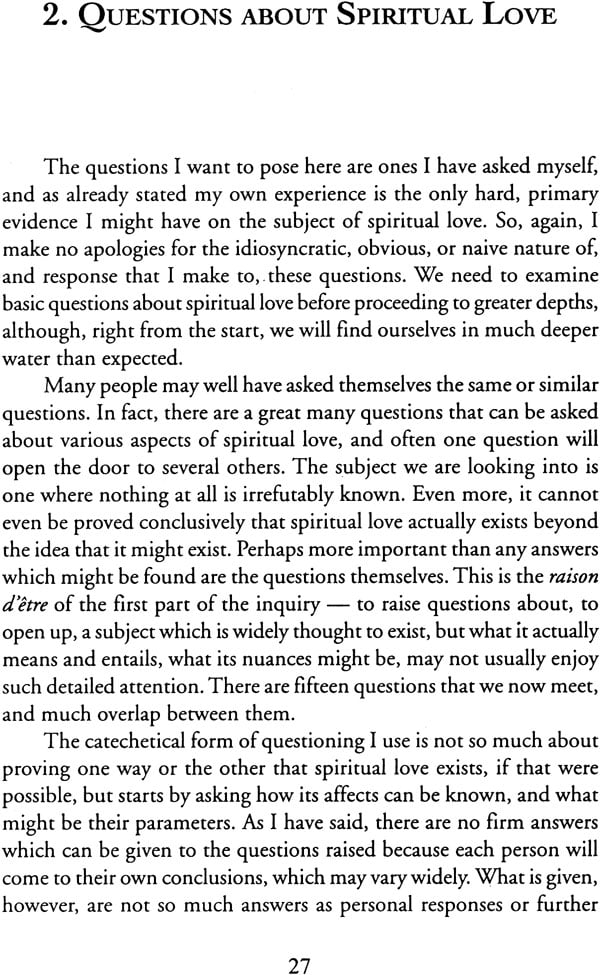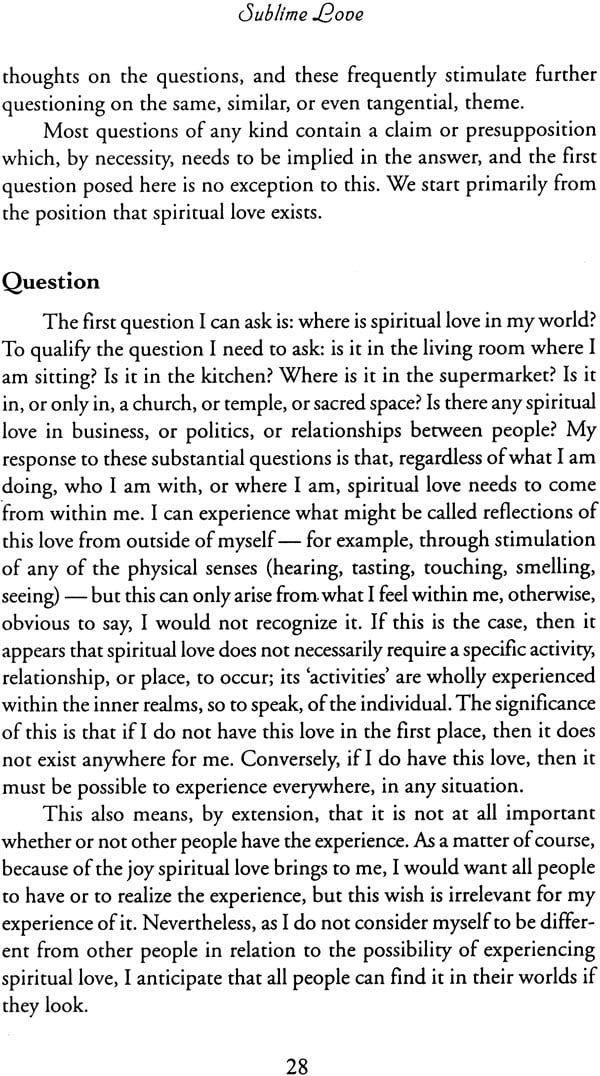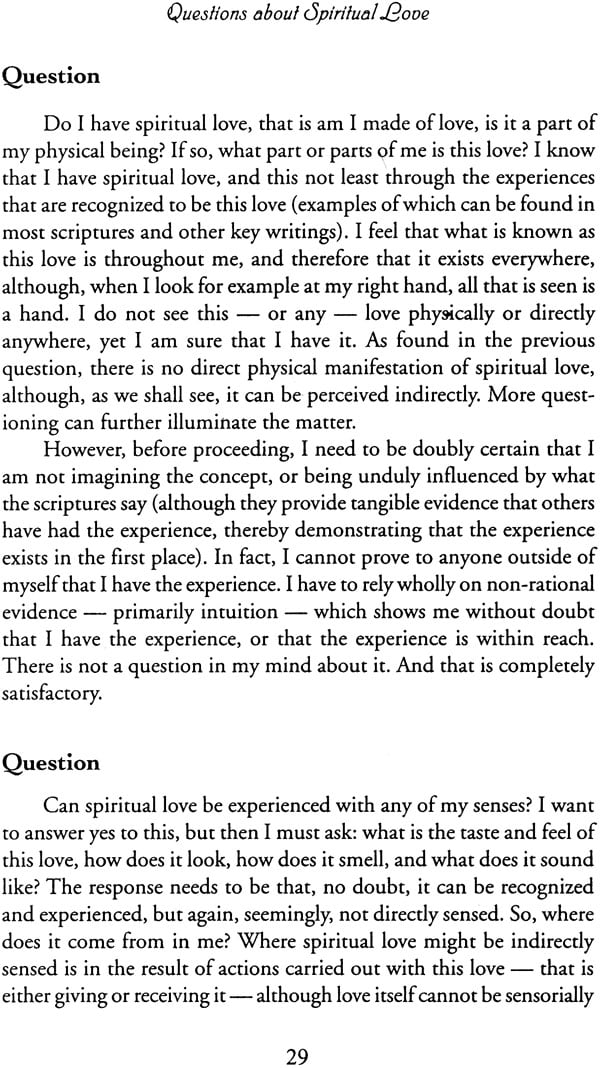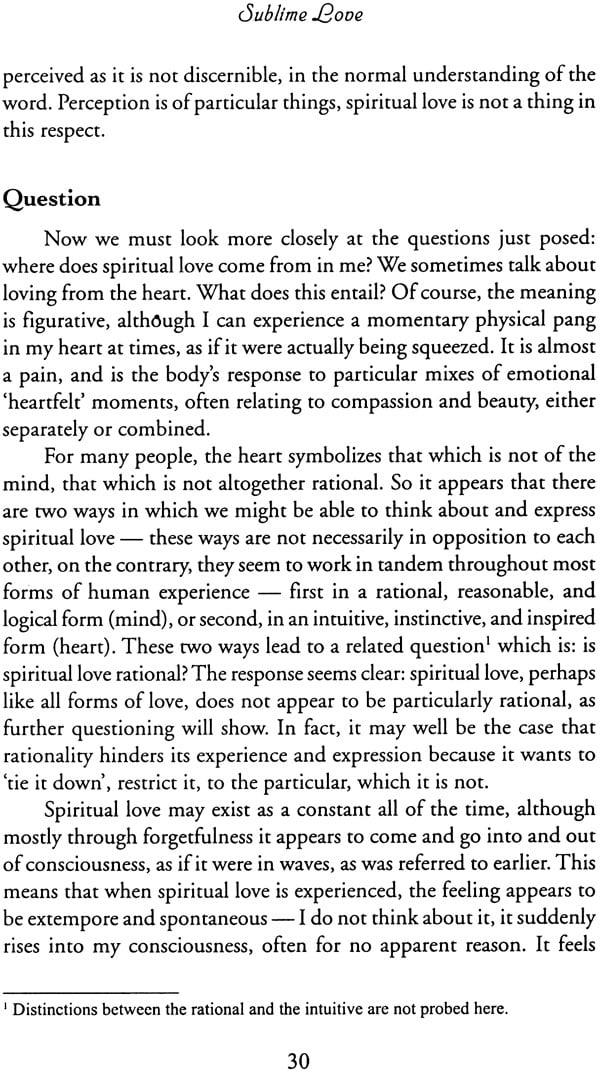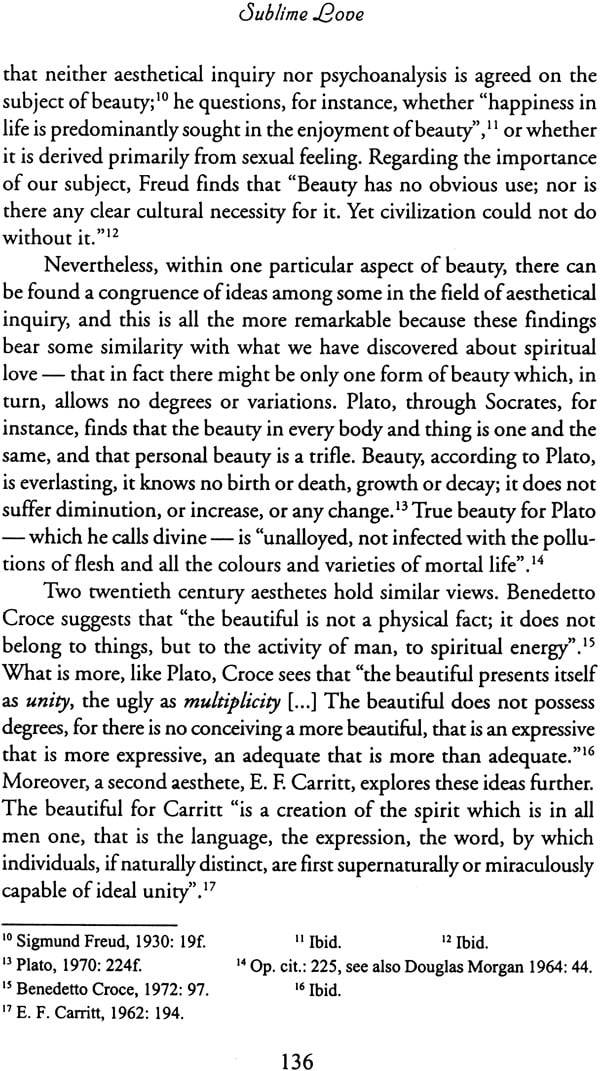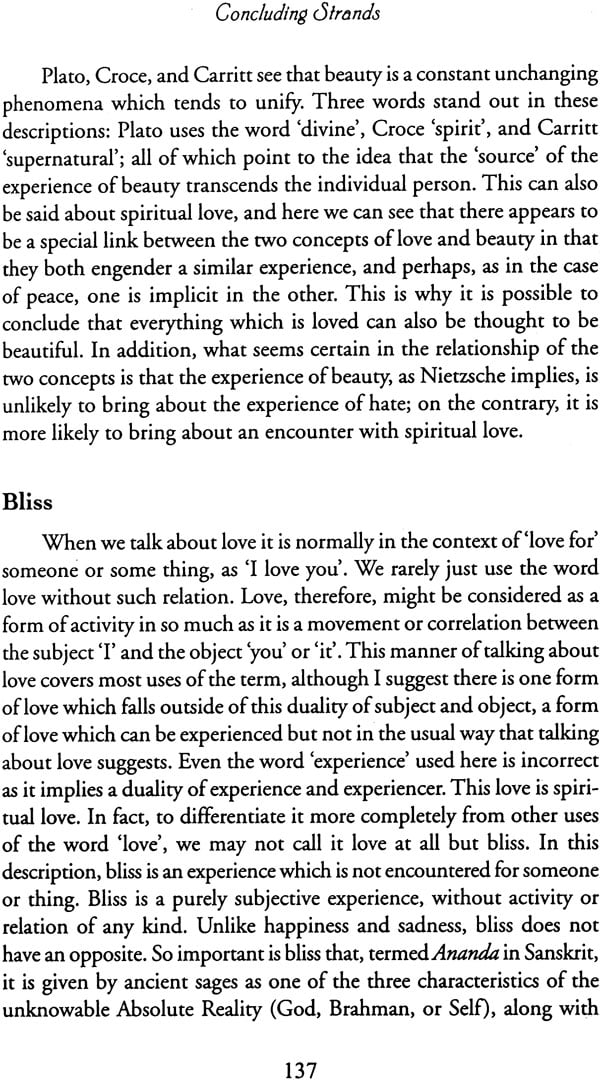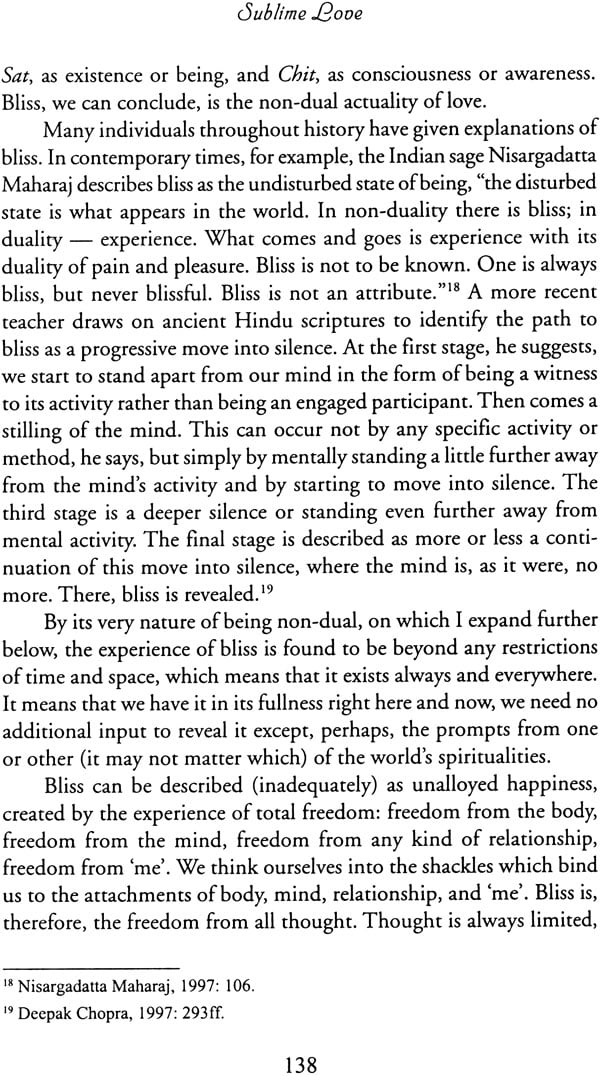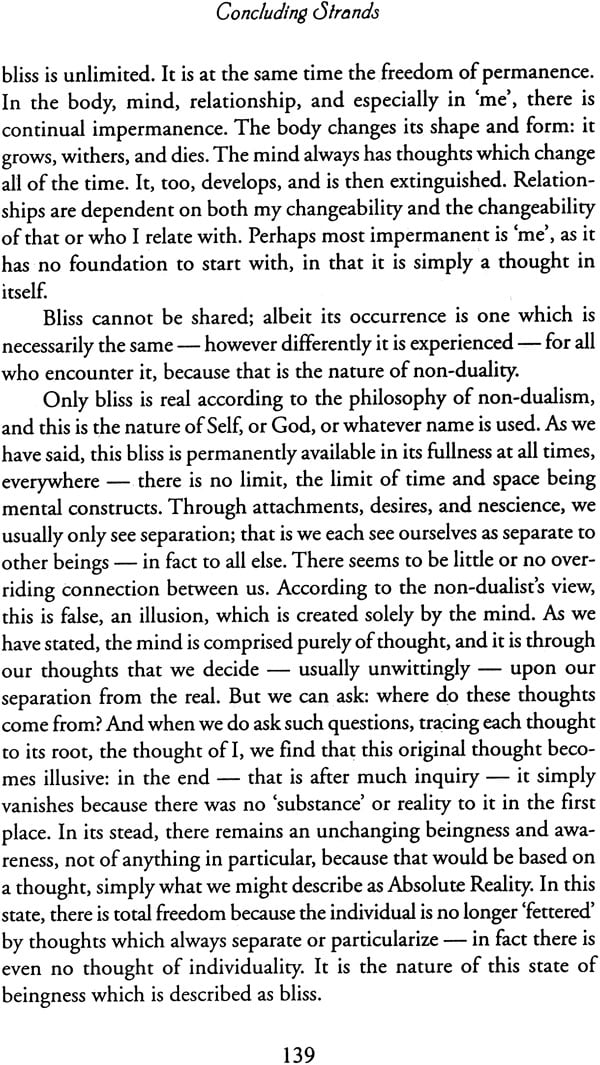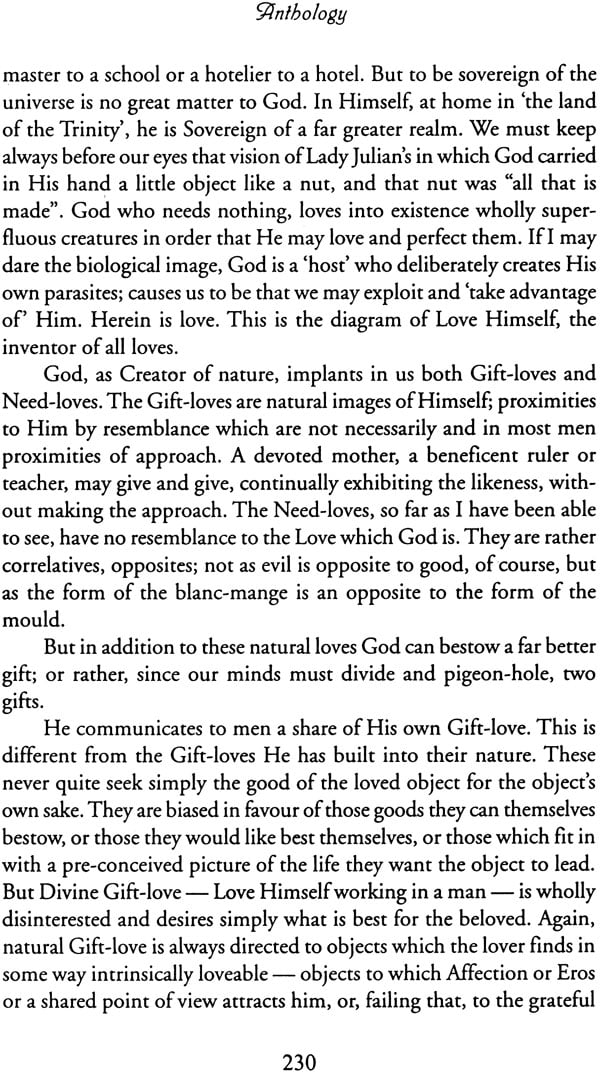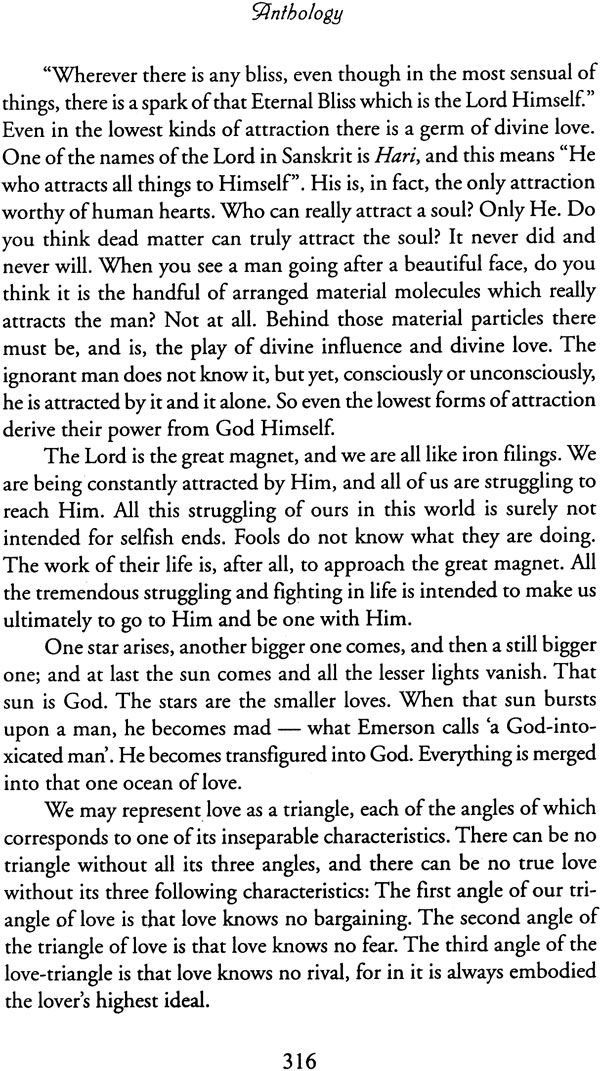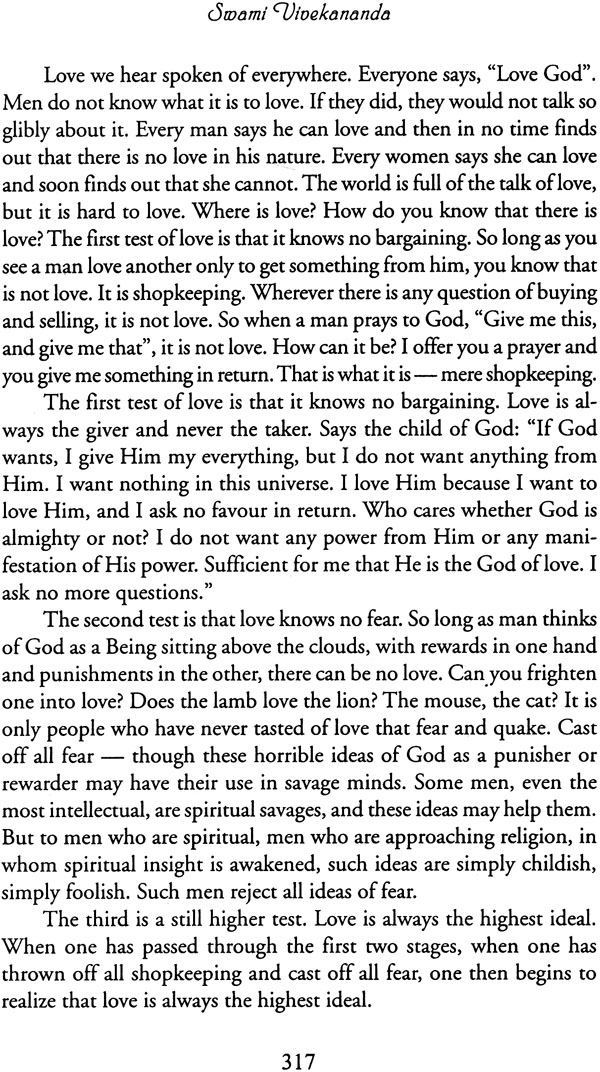
Sublime Love (Essay and Anthology)
Book Specification
| Item Code: | IDJ510 |
| Author: | Stuart Rose |
| Publisher: | Indica Books, Varanasi |
| Language: | English |
| Edition: | 2007 |
| ISBN: | 8186569685 |
| Pages: | 337 |
| Cover: | Paperback |
| Other Details | 8.5 inch X 5.5 inch |
| Weight | 290 gm |
Book Description
Back of the Book
Sublime Love is an enquiry into the heart of all religions and spiritualities, into that which gives them meaningfulness. In two parts, Sublime Love first meets with and illuminates spiritual love from every angle, and seeks to establish much more precisely than hitherto what spiritual love is, and what it entails. The second part is a comprehensive collection of this love's most important non-mystical writings, which seeks to broaden and extend what has been found in the first part.
In the essay, first many questions are raised and responses given from a personal perspective-the only possible primary 'evidence'. Then three well-known scriptural accounts of spiritual love are given in full with discussion: Krishna, Jesus and the Buddha. Questions were put to authorities on spiritual love (priests, rabbis, monks, and the like), including: Are all neighbors to be loved? Does love always entail suffering? Through literature analysis and more questions, six nuances are explained. Is the experience the same for women and men? Is spiritual love unconditional? And what is the relationship between spiritual love and sexuality? Finally, four vital elements are met: Self, peace, beauty, and bliss. The essay ends with two parts illuminating spiritual love at its very highest.
After a short context setting introduction to each entry, the Anthology presents substantial extracts from 36 writings, including: Aquinas, Aurobindo, Bahya, Dionysius, Fromm, al Ghazzali, Gibran, Gurdjieff, Kierkegaard, Lewis, Maslow, Merton, Mo-tse, Plato, Plotinus, Tolstoy, and Vivekananda.
Stuart Rose has a Ph.D. in Religious Studies, and has lived, traveled and worked in many countries and organizations. He now lives simply, away from the world.
Introduction
The greatest happiness a person can find in the world is most often through the love of another person, yet there is thought to be an even greater love, one which creates even greater happiness. This love is not necessarily centered on a particular person; according to those who have had the experience, it becomes more clearly apparent once individuality is reduced or, all the more so, if it is lost altogether. This is spiritual love.
Throughout history, many people from Plato to Tolstoy have written that the love of another person can be mentally and physically fulfilling, but only to a certain degree. They feel that spiritual love adds something or is greater and can be even more fulfilling, more all encompassing and that its source may not be of the mundane world. The aim of this book is to illuminate this latter love, to find out something of what it might entail.
As the origin of spiritual love might be beyond this world, so to speak, it is therefore also likely to be beyond full explanation and description through purely rational means. Perhaps it cannot be explained fully at all. What can be said for certain is very little, possibly only that love itself exists; although we cannot prove it conclusively, we just believe strongly that it does through our experiences of it. Beyond this almost wholly agreed fact, what spiritual love- as a type or recognizable encounter with love-might be is the subject of much conjecture and personal interpretation. On the one hand, spiritual love can be thought of as a particular experience of a larger or wider love, while on the other hand it can be thought of as the source of all types and experiences of love. There are, as we will see, no hard and fast certainties about what love is. What seems to be the case is that spiritual love, like all loves, cannot be defined in a way that every person would have a similar understanding of what it might be or might incorporate.
All love, not just spiritual love, can be described as one of the most-if not the most-exceptional human experiences which occur, and one of its particular characteristics is that it is perhaps the most uncontrollable of all our experiences. We cannot choose when to love, nor even who or what to love. Love just comes, or not. It can be continuous and consistent, but more often it has waves or surges whereby it can be described as one of the most-if not the most-exceptional human experiences which occur, and one of its particular characteristics is that it is perhaps the most uncontrollable of all our experiences. We cannot choose when to love, nor even who or what to love. Love just comes, or not. It can be continuous and consistent, but more often it has waves or surges whereby it can be experienced more deeply and fully or less so at any moment in time, and we rarely have any real inkling of why this should be. Understandably, there are occasions which can be created when love might be felt more, although this may not happen without love being felt in the first place, no matter how dimly or in which direction.
The same ups and downs may be true for spiritual love, although it would seem more likely that, for a spiritual person, this love could occur more-more strongly, more deeply or more consistently-than for a non-spiritual person, but this need not necessarily be the case, as anyone, sometimes out of the blue, can experience spiritual person would ever experience spiritual love. There are no incontrovertible rules that can be applied to this or any form of love.
No one has come up with a satisfactory definition or explanation of love that all can agree, nor, I submit, is it likely that anyone ever will. Yet we all experience it to greater or lesser degrees. It is innate. What is more, there is no reason to suppose, nor convincing evidence to show either way, that all life forms cannot have the same experience. Certainly, by observation, we can see that human beings enjoy the experience, and it is also quite possible to interpret that dogs, cats, apes, horses, and many other life forms do, too. Does the blackbird on the garden lawn feeding its fledgling standing beings, or should not a flower, an ocean, a meteor, or space itself, be excluded from some ability to experience love, in that, is love everywhere regardless of physical substance? And can any meaningful answer be made for this question? We will meet with this conundrum again, and others will be explored throughout the course of this questioning of what spiritual love is.
To be sure, some people will see spiritual love as just one of a number of particularly human experiences. Some will see this love to have an opposite, whereas others not. Some will see this love everywhere, infusing everything, and others will say that it does not exist, or that it only exists as a figment of the imagination. However, it is possible, maybe even probable, that all people and all beings experience spiritual love in some form or another, weak or strong, during their lives, and yet so little is known about it. Perhaps through these pages more can be known.
| 1. | Introduction | 13 |
| Explanation of key words | 15 | |
| Spiritual love and mysticism | 20 | |
| Plan of the chapters | 22 | |
| Personal interest | 24 | |
| 2. | Questions about Spiritual Love | 27 |
| 3. | Spiritual Love in Religious Texts | 46 |
| Krishna | 47 | |
| Jesus | 55 | |
| Buddha | 62 | |
| Scriptural love | 69 | |
| Is there a different between historical and contemporary teachings on spiritual love? | 71 | |
| 4. | Questioning the Authorities | 75 |
| What the authorities said | 77 | |
| Review of what the authorities | 87 | |
| 5. | Features and Nuances of Spiritual Love | 90 |
| The different for women and men | 91 | |
| Is ecstasy spiritual love? | 98 | |
| Different types of love | 100 | |
| Unconditional love | 107 | |
| What is not spiritual love | 110 | |
| The relationship between spiritual love and sexuality, desire, and passion | 114 | |
| 6. | Concluding Strands | 123 |
| Self | 126 | |
| Peace | 130 | |
| Beauty | 133 | |
| Bliss | 137 | |
| Ending | 142 | |
| Concluding strand | 144 | |
| 7. | Anthology | 147 |
| Robert Adams | 149 | |
| Thomas Aquinas | 154 | |
| Sri Aurobindo | 157 | |
| Bahya Ibn Paquda | 162 | |
| Dionysius | 167 | |
| Emile Durkheim | 172 | |
| Leone Ebreo | 175 | |
| Victor Frankl | 180 | |
| Erich Fromm | 184 | |
| Al-Ghazali | 190 | |
| Kahlil Gibran | 194 | |
| G.I. Gurdjieff | 197 | |
| Aldous Huxley | 200 | |
| Karl Jaspers | 205 | |
| Hazrat Inayat Khan | 210 | |
| Soren Kierkegaard | 216 | |
| Jiddu Krishnamurti | 221 | |
| C. S. Lewis | 229 | |
| Gabriel Honore Marcel | 233 | |
| Abraham Maslow | 237 | |
| Thomas Merton | 244 | |
| Mo-tze | 246 | |
| Jacob Needleman | 251 | |
| Anders Nygren | 255 | |
| P. D. Ouspensky | 261 | |
| Plato | 266 | |
| Plotinus | 269 | |
| Max Scheler | 274 | |
| Vladimir Solovyov | 280 | |
| Benedictus de Spinoza | 285 | |
| Rudolf Steiner | 290 | |
| Pierre Teilhard de Chardin | 294 | |
| Tenzin Gyatso, H.H. the 14th Dalai Lama | 302 | |
| Leo Tolstoy | 309 | |
| Swami Vivekananda | 314 | |
| Alan Watts | 320 | |
| List of References Cited | 329 |
